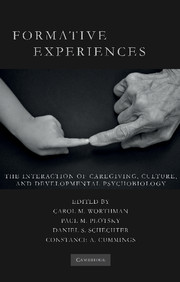Book contents
- Frontmatter
- Contents
- List of Figures
- List of Tables
- List of Contributors
- Foreword by Robert Sapolsky
- Preface
- List of Abbreviations
- Introduction
- SECTION ONE HISTORICAL, CROSS-CULTURAL, AND DEVELOPMENTAL SCIENCE PERSPECTIVES
- SECTION TWO HOW EXPERIENCE INTERACTS WITH BIOLOGICAL DEVELOPMENT
- SECTION THREE FORMATIVE RELATIONSHIPS WITHIN AND ACROSS GENERATIONS
- 7 Ethnographic Case Study: Bofi Foragers and Farmers – Case Studies on the Determinants of Parenting Behavior and Early Childhood Experiences
- Commentary
- Commentary
- 8 Clinical Case Study: Good Expectations – A Case Study of Perinatal Child-Parent Psychotherapy to Prevent the Intergenerational Transmission of Trauma
- Commentary
- Commentary
- 9 Ethological Case Study: Infant Abuse in Rhesus Macaques
- Commentary
- Commentary
- 10 Clinical Case Study: Multigenerational Ataques De Nervios in a Dominican American Family – A Form of Intergenerational Transmission of Violent Trauma?
- Commentary
- Commentary
- SECTION FOUR SOCIAL AND CULTURAL CONTEXTS OF CHILDHOOD DEVELOPMENT – NORMATIVE SETTINGS, PRACTICES, AND CONSEQUENCES
- SECTION FIVE FEAR, FUN, AND THE BOUNDARIES OF SOCIAL EXPERIENCE
- SECTION SIX PUBLIC HEALTH, EDUCATION, AND POLICY IMPLICATIONS
- Index
- References
Commentary
Published online by Cambridge University Press: 26 May 2010
- Frontmatter
- Contents
- List of Figures
- List of Tables
- List of Contributors
- Foreword by Robert Sapolsky
- Preface
- List of Abbreviations
- Introduction
- SECTION ONE HISTORICAL, CROSS-CULTURAL, AND DEVELOPMENTAL SCIENCE PERSPECTIVES
- SECTION TWO HOW EXPERIENCE INTERACTS WITH BIOLOGICAL DEVELOPMENT
- SECTION THREE FORMATIVE RELATIONSHIPS WITHIN AND ACROSS GENERATIONS
- 7 Ethnographic Case Study: Bofi Foragers and Farmers – Case Studies on the Determinants of Parenting Behavior and Early Childhood Experiences
- Commentary
- Commentary
- 8 Clinical Case Study: Good Expectations – A Case Study of Perinatal Child-Parent Psychotherapy to Prevent the Intergenerational Transmission of Trauma
- Commentary
- Commentary
- 9 Ethological Case Study: Infant Abuse in Rhesus Macaques
- Commentary
- Commentary
- 10 Clinical Case Study: Multigenerational Ataques De Nervios in a Dominican American Family – A Form of Intergenerational Transmission of Violent Trauma?
- Commentary
- Commentary
- SECTION FOUR SOCIAL AND CULTURAL CONTEXTS OF CHILDHOOD DEVELOPMENT – NORMATIVE SETTINGS, PRACTICES, AND CONSEQUENCES
- SECTION FIVE FEAR, FUN, AND THE BOUNDARIES OF SOCIAL EXPERIENCE
- SECTION SIX PUBLIC HEALTH, EDUCATION, AND POLICY IMPLICATIONS
- Index
- References
Summary
In this chapter, Dr. Fouts presents observational data on two boys, Anbo and Dema, aged 2 years, who live in the Congo Basin rainforest in the Central African Republic. The children are members of two different subgroups of the Bofi speaking people who are exposed to different rearing conditions: Anbo's parents primarily hunt in the forest whereas Dema's family lives in a nearby farming community.
The author presents these two case studies to detail the individual parenting these boys experience and to illustrate the “tension” between evolutionary and cultural contexts as they are reflected in the children's lives. Although the author discusses her case examples primarily from an anthropological and social and ecological point of view, I will discuss this “tension” from the point of view of my experience as an academic infant and child psychiatrist who also lived and practiced for some years in sub-Saharan Africa. Thus my comments will use an ecocultural perspective that is based on two assumptions: (a) the “universalist” assumption, which implies that human societies exhibit significant commonalities and that children have universal biological and emotional developmental needs; and (b) the “adaptive” assumption, which views behavior as differentially developed and expressed in response to ecological and cultural contexts (Berry, Poortinga, Segall, & Dasen, 2002). Under the adaptive assumption, individual parents or small groups may use their universal ability, for example, e.g., speech or the provision of physical punishment in a variety of culturally determined ways.
- Type
- Chapter
- Information
- Formative ExperiencesThe Interaction of Caregiving, Culture, and Developmental Psychobiology, pp. 191 - 196Publisher: Cambridge University PressPrint publication year: 2010

